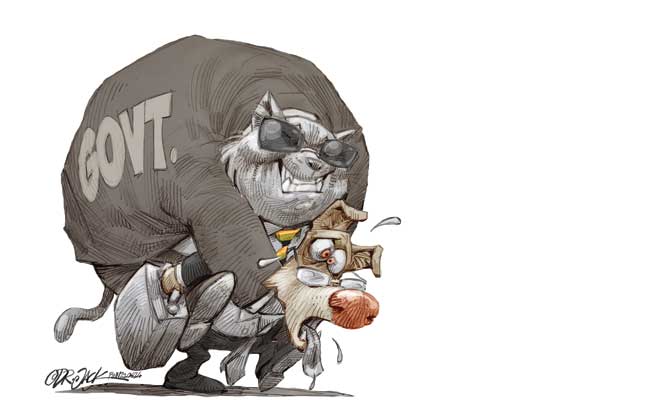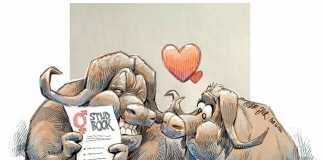
South Africa’s economy is in a mess, to say the least, and this is solely and exclusively the fault of policymakers. Yet it is not beyond redemption.
The overall remedy lies in simply utilising empirical evidence in the form of studies that demonstrate the close and proven correlation between economic freedom (free markets) and high economic growth, which in turn translates to increased GDP per capita, high employment levels, better education and increased lifespans: all the positive social indicators that collectively amount to a good, contented and prosperous life.
The Human Freedom Index (published by the Cato Institute), the Index of Economic Freedom (Heritage Foundation and The Wall Street Journal), the International Property Rights Index (initiated by economist Hernando de Soto and involving the Property Rights Alliance) and Economic Freedom of the World (Fraser Institute and over 100 think tanks worldwide) all attest to the axiomatic, empirically verifiable connection between economic freedom and economic growth, and the positive social outcomes that emanate from this.
South Africa’s slide
The socio-economic misery of South Africa is self-inflicted and, ipso facto, can be reversed, as illustrated in the Economic Freedom of the World (EFW) report, which is evidenced by the above-mentioned studies. The EFW report ranks countries according to the measurement of their level of economic freedom. South Africa features at position 84 out of 165 countries, according to the EFW’s annual report of 2019.
After being placed 54th in 2000, South Africa’s measure of economic freedom has gone into a sorry decline, hitting 62nd in 2005 and 79th in 2010.
Given the evidence of these empirical studies, it is clear that leaders need to bring about a policy regime that reflects the highest levels of economic freedom. First, however, there are some impediments to freeing up the economy that may encourage leaders and officials down a harmful path, and these need to be done away with.
Widely tempting seem to be the measures advocated to address income inequality as proposed by Thomas Piketty in his book Capital in the Twenty-First Century.
Piketty advocates punitive redistributive tax measures that target the richest individuals and business entities. The consequences of this will be to negate capital formation and drive the capital in the hands of the wealthy to other entrepreneurial-friendly markets.
Piketty’s thesis even echoes the words of the founder of communism, Karl Marx, who said: “There is only one way to kill capitalism – by taxes, taxes and more taxes.”
It also complies with the statement made by the late communist leader of Russia, Vladimir Lenin: “The way to crush the bourgeoisie is to grind them between the millstone of taxation and inflation.”
The Piketty thesis will not work, because in stark contrast to these ideas is the reality of human nature. People are endowed differently, and have different tastes, preferences and priorities, with different rankings thereof. They embark on a whole diversity of socio-economic endeavours to lead contented lives and enjoy happiness.
When people are free to exploit their internal resources, the outcomes naturally manifest in various ways and degrees. Some embark on business ventures, even when at great risk, as there are no guarantees of success.
The element of risk, and its degree, explains why entrepreneurs are few and far between in any community or country. Most people seek a less risky means of earning an income by choosing to work in established business enterprises. Other individuals prefer to pursue initiatives in spheres of human endeavour such as sporting activities, music, and fine arts.
Not surprisingly and inevitably, the income outcomes will manifest a range of differentials. Piketty negates this aspect of the real nature of humans, because his proposal contradicts economic freedom.
“The worst form of inequality is to make unequal things equal,” was the incisive wisdom of Greek philosopher Aristotle.
The failure of affirmative action
Another block to growing an economy is affirmative action. Empirical evidence abounds to the effect that in any country where affirmative action policies have been implemented, the results have been totally counterproductive.
A case in point is the US. After more than 50 years of affirmative action policies being implemented to boost the social fortunes of a targeted beneficiary group, this group, the African Americans, occupies the lowest rung of that country’s socio-economic ladder.
Affirmative action policies the world over have only ever demonstrably benefitted politically connected elites, as is the case in South Africa.
China’s achievement
In South Africa, a plethora of policies should be abrogated, because they negate the economic freedoms of individuals and thus have a detrimental impact on the socio-economic welfare of the country.
The contemplated policy of land expropriation without compensation would clearly be a socio-economic disaster.
Economic freedom is defined in terms of the fundamental principles of protection of private property, voluntary exchange, freedom to choose, and freedom to compete. Policies collectively defined within these parameters would launch this country on a trajectory of high economic growth, overall prosperity, and happiness.
This is exactly what happened in the People’s Republic of China. Starting in 1972 at Shenzhen in Guangdong province with the liberation of the agriculture sector from the clutches of the state, Deng Xiaoping, at the helm of the communist state, implemented the most radical free market experiment (historically unprecedented) in areas designated as special economic zones (free trade/market zones).
The result, according to the World Bank, has been, within decades, the self-upliftment of over 500 million Chinese people from poverty.
Yet it remains a noteworthy paradox that the communist system of China is brutally politically repressive as a one-party state, and that under the aegis of Xi Jinping at the helm, economic trade policies are being implemented on an aggressive, mercantilist path. Nonetheless, the lesson to be extracted from the Chinese experiment in the special economic zones is that economic freedom, which means free markets, delivers.
Saving South Africa
Here in South Africa, it is possible to reverse the damage and set the country on a high-growth economic trajectory. For the lack of economic growth, the buck stops with government, and no one else. That cannot be emphasised enough.
Scapegoating by blaming this country’s shortcomings on apartheid, colonialism, and the discredited, nonsensical concept of white monopoly capital, or some individual white industrialists, is calculated to deflect attention from those supposed leaders and their acolytes and rent-seekers who are wholly responsible for, and cause, the perpetuation of the mess.
In a nutshell, government should just get the hell off the backs of the creators of employment and wealth, namely the private sector. FW










